Key takeaways:
- Cannabis edibles offer diverse effects and experiences, differing significantly from smoking, with a need for cautious dosing, especially for newcomers.
- Industry advocacy is crucial for safe consumer experiences, education, and the progression of regulations, as collective efforts can influence legislation and public perception.
- Current trends in the cannabis edibles market include healthier ingredients and microdosing options, catering to a broader audience and addressing past consumer hesitations.
- Challenges such as inconsistent dosing, regulatory uncertainties, and stigma must be tackled to enhance acceptance and innovation within the cannabis edibles industry.
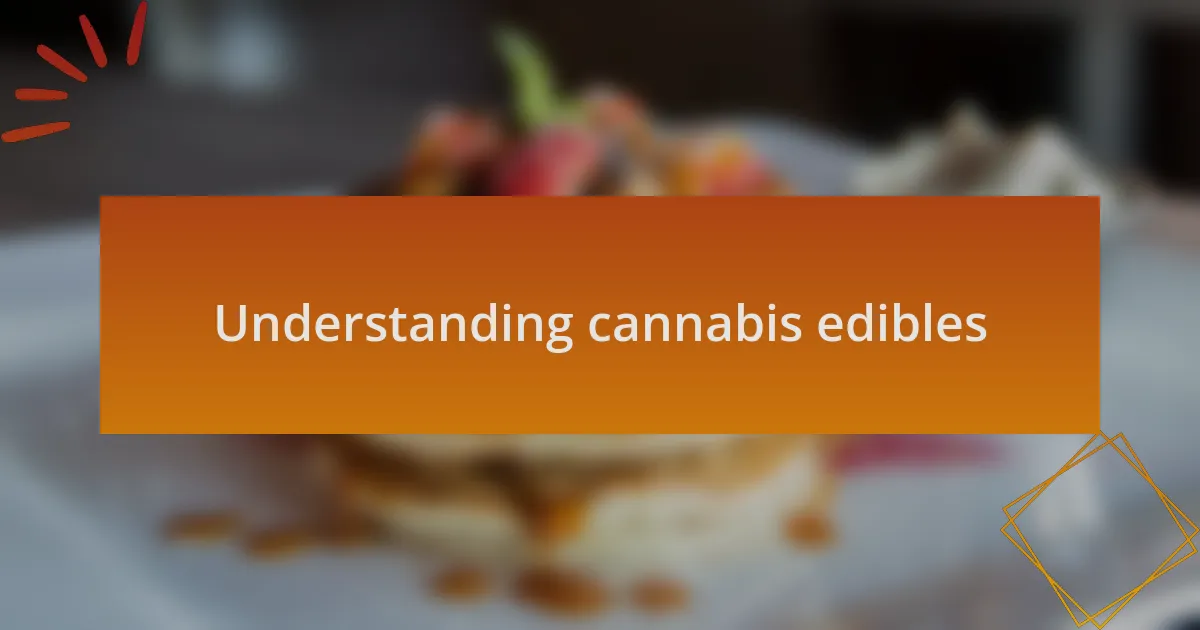
Understanding cannabis edibles
Cannabis edibles are food products infused with cannabinoids, primarily THC and CBD. I remember the first time I tried a cannabis-infused brownie; the experience was surprisingly potent yet enjoyable. It’s essential to understand that the effects of edibles can differ significantly from smoking or vaping, often taking longer to kick in and lasting much longer.
When it comes to dosage, I believe moderation is key. For someone new to edibles, starting with a low dose—like 5mg of THC—is a common recommendation. Have you ever wondered why edibles can hit harder than expected? It all boils down to how our bodies metabolize cannabinoids, especially when they reach the liver.
The variety available today is astounding, from gummies to chocolate bars and even savory snacks. I find it fascinating how these products can cater to differing tastes and preferences, making the cannabis experience more accessible. With so many choices, it’s important to pay attention to both the potency and the quality of the ingredients—after all, no one wants a subpar experience when they’re looking to unwind or treat themselves.
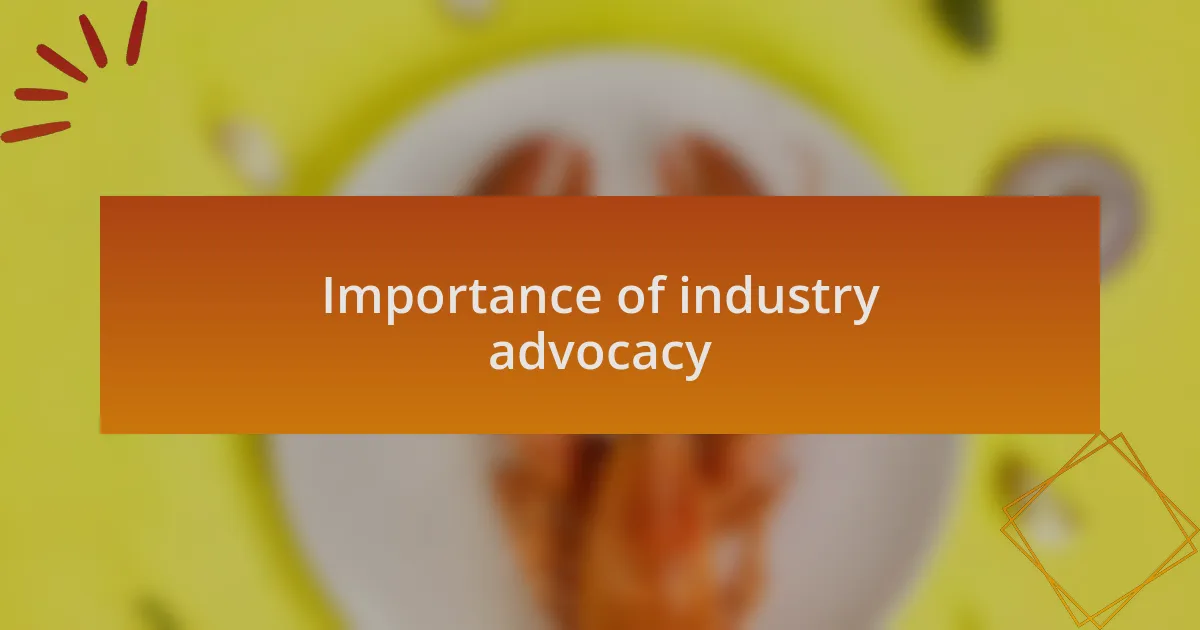
Importance of industry advocacy
Advocating for the cannabis industry is crucial for ensuring that our voices are heard in the ever-evolving regulatory landscape. I often think about how my own experience attending advocacy events opened my eyes to the challenges we face. It’s not just about legality; it’s about creating a safe environment for consumers and protecting the rights of those who produce these products.
One thing I’ve noticed is that when we rally together, our impact can be profound. I remember participating in a local rally—seeing different stakeholders unite for a common cause gave me hope. Advocacy can influence legislation and public perception, ultimately shaping the market to reflect the values of our community. Have you realized how much a cohesive effort can change the world around us?
Finally, industry advocacy is vital for promoting consumer education and safety. My own journey into understanding the nuances of cannabis edibles was partially fueled by well-organized educational initiatives. It’s critical that we all engage in these discussions to foster a knowledgeable community, ensuring safe consumption practices and preventing misinformation from spreading.
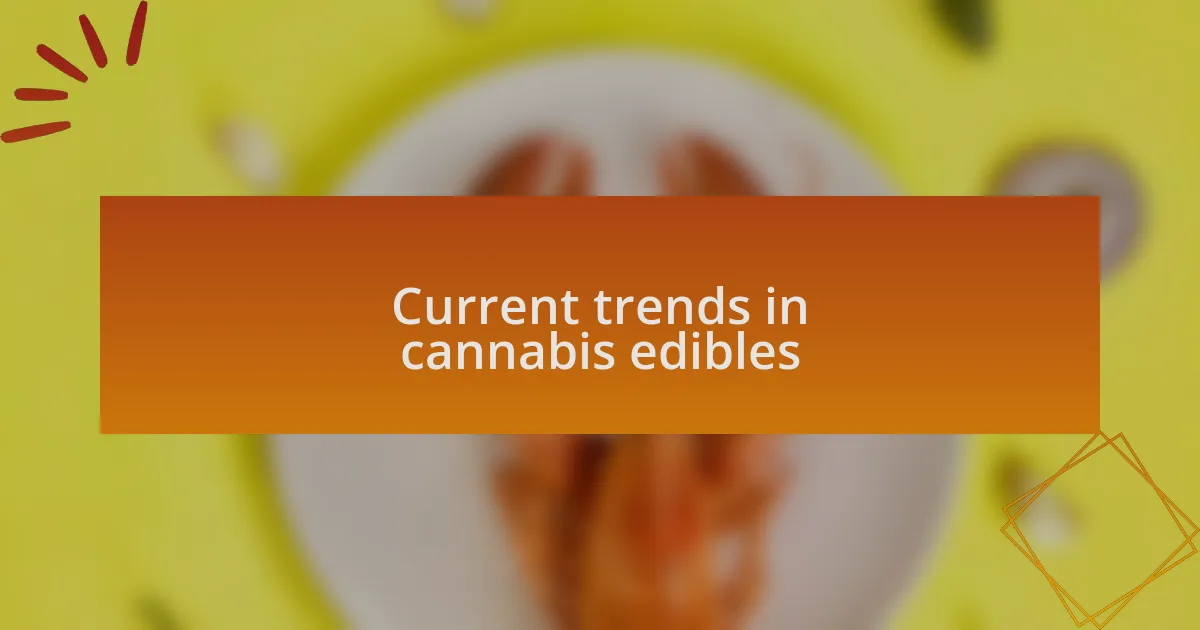
Current trends in cannabis edibles
One of the most striking trends I’m witnessing in the world of cannabis edibles is the move towards healthier, more natural ingredients. It’s fascinating to see brands transitioning from artificial additives to whole-food ingredients, reflecting a growing consumer demand for transparency and wellness. I remember trying a hemp-infused granola bar, and it truly opened my eyes to how delicious and nutritious cannabis edibles can be when made thoughtfully.
Another notable shift is the rise of microdosing products. Many consumers, myself included, are looking for more controlled experiences with cannabis. I often think about my friends who are hesitant to try edibles due to past experiences with overly potent products. The introduction of precisely dosed edibles allows newcomers to engage safely, creating a more inclusive atmosphere for those wary of cannabis.
Lastly, the innovation in flavor profiles has taken the edible market by storm. Personally, I find unique combinations, like lavender-infused chocolates or spicy jalapeño gummies, to be both surprising and delightful. Have you ever tasted something that made you rethink what cannabis could be? This creativity not only excites existing consumers but also piques the interest of those who may not have considered cannabis edibles before.
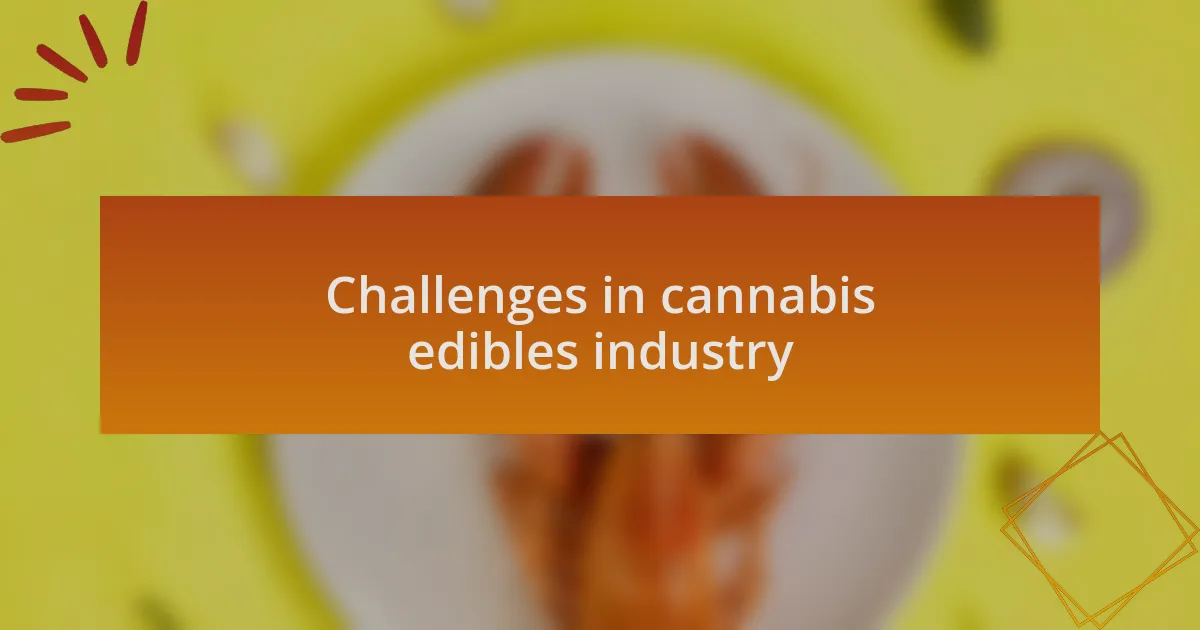
Challenges in cannabis edibles industry
The challenges in the cannabis edibles industry are multifaceted and often interconnected. For instance, consistency in dosing remains a significant hurdle. I recall an experience where I tried two different brownies from the same brand, yet one left me feeling pleasantly euphoric while the other left me anxious and jittery. It made me wonder how many others have encountered this variation and whether it deters newcomers from exploring the edible market.
Another pressing issue is regulatory uncertainty. Each state has its own set of rules governing the production and sale of cannabis edibles, which creates confusion for both manufacturers and consumers. I once attended a product fair where vendors shared stories of shipping issues and legal challenges. It struck me how these regulatory inconsistencies can stifle innovation and limit the options available to consumers.
Lastly, there’s the stigma surrounding cannabis itself that can impact acceptance in mainstream markets. Despite the growing popularity of edibles, some potential consumers remain hesitant, influenced by outdated perceptions. I often ask myself, how many people are missing out on wonderful experiences simply because of lingering misconceptions? Addressing this stigma is crucial for the industry to thrive and fully realize its potential.
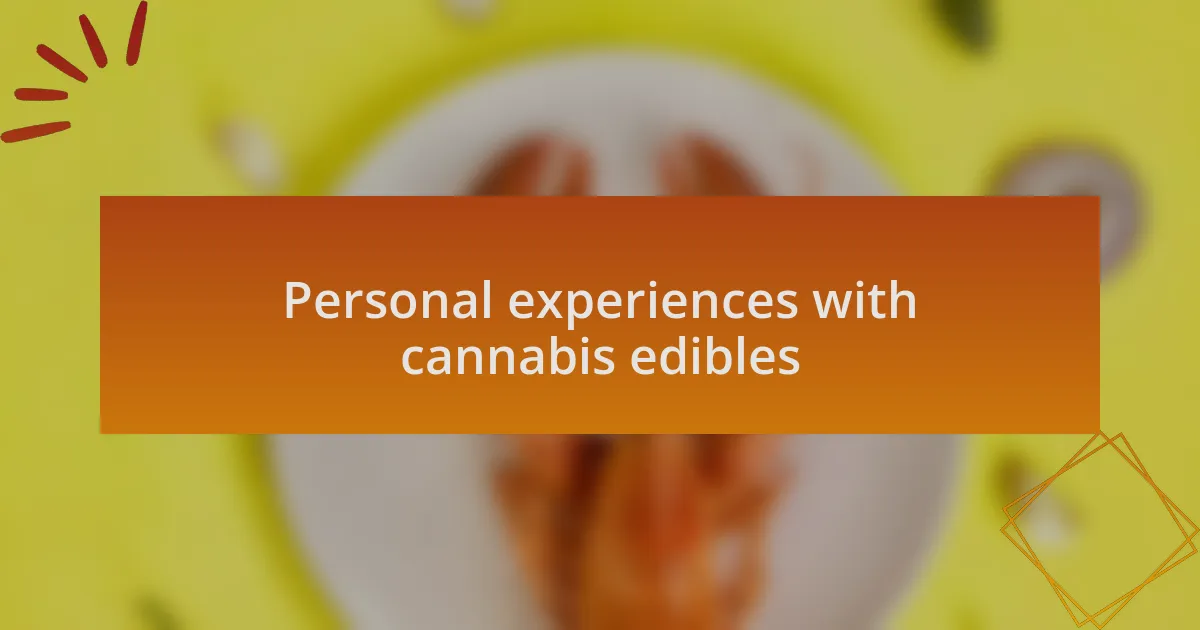
Personal experiences with cannabis edibles
When it comes to my personal experiences with cannabis edibles, I’ve discovered that the journey can be quite revealing. For example, I once tried a raspberry-infused gummy that promised a mild effect, but the experience hit me harder than expected. I found myself lost in a fit of laughter at a movie night, and it made me reflect on how edibles can sometimes surprise you with their potency, leaving me to wonder how many others have misjudged their limits.
Another memorable instance was trying my first infused chocolate bar. I savored the rich flavor, and to my delight, the effects gradually crept in without overwhelming me. I felt a wave of relaxation wash over me, enhancing the evening with friends. This experience highlighted the beauty of edibles—they can transform a simple gathering into something unforgettable, but I also recognized that not everyone may have the same positive experience.
Yet, I’ve also faced challenges. I remember a time when I underestimated the strength of a homemade brownie during a gathering, only to end up feeling more detached from my surroundings. It made me contemplate how important it is to communicate dosage clearly, especially in social settings. How can we create a safe space for exploration if everyone isn’t on the same page about what they’re consuming? It’s a thought-provoking aspect of enjoying cannabis edibles that sticks with me.

How to advocate for change
Advocating for change in the cannabis industry can feel daunting, but I’ve found that starting small can make a big impact. For instance, I once organized a local community event focused on educating people about the benefits and risks of cannabis edibles. I noticed that when I shared my story, it encouraged others to voice their experiences too, creating an open dialogue that empowered everyone. Isn’t it fascinating how personal narratives can spark broader conversations?
Another way to advocate is through social media. I regularly share informative posts about cannabis regulations and the importance of safe consumption. One time, a friend reached out to say that my post had prompted them to research the local laws more deeply. That interaction reminded me of the power of digital platforms in mobilizing support and spreading awareness—it’s as if we are all part of a larger movement, aiming for change together.
I’ve also discovered that engaging with policymaking can be incredibly impactful. I attended a town hall meeting once, where local lawmakers were discussing cannabis legislation. I took a moment to express the need for clearer labeling on edibles, thanks to my past experiences with potency surprises. The sincerity of my plea seemed to resonate with others in the room. Have you ever felt the rush of sharing your voice in a room full of decision-makers? It was empowering, and it reinforced my belief in active participation to drive future change.
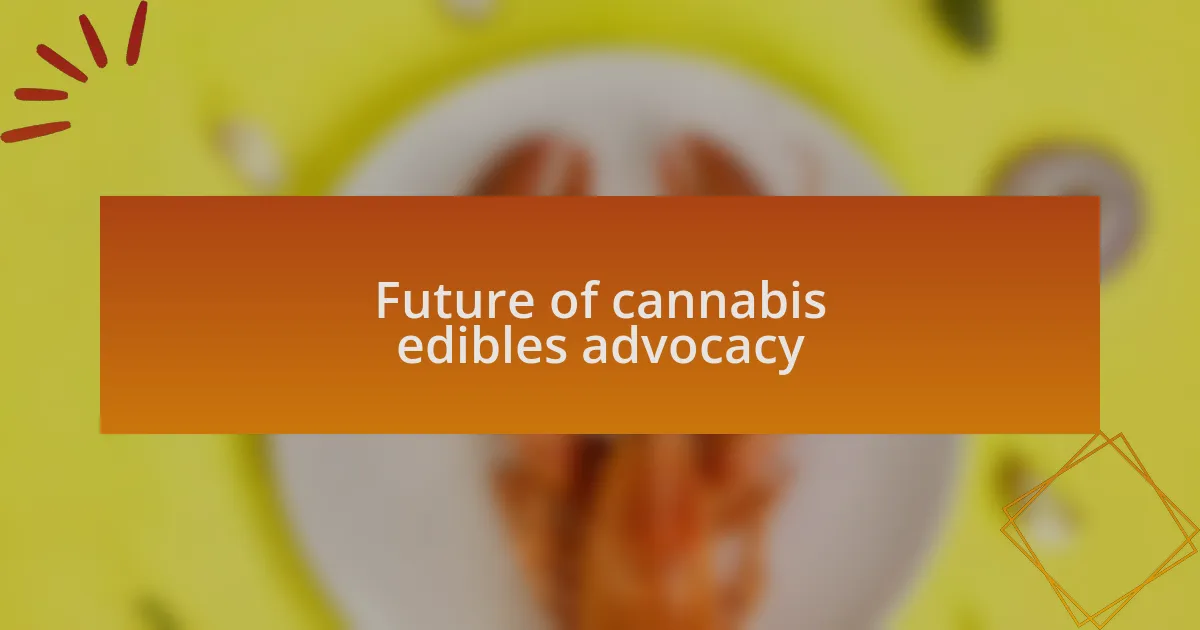
Future of cannabis edibles advocacy
As I reflect on the future of cannabis edibles advocacy, I see a wave of innovation that demands our attention. The growing interest in plant-based ingredients and sustainable practices could pave the way for healthier, more responsible consumption. Have you noticed how consumers increasingly prioritize transparency in product sourcing? This trend suggests that advocacy efforts must not only address legislation but also promote ethical standards within the industry.
I remember attending a panel discussion where experts debated the future of cannabis edibles regulation. The excitement in the room was palpable as attendees brainstormed ideas for more comprehensive consumer education. It’s clear to me that grassroots movements focusing on informed choices can shape edible standards more effectively than top-down mandates alone. Wouldn’t it be amazing if we could create a network of advocates who continuously share knowledge and experiences?
Looking ahead, I believe technology will play a critical role in shaping the future of advocacy. For instance, imagine using apps that help consumers track and review the potency of edibles in real time. I recently experimented with a new app that analyzes user reviews and contains potent safety information, making me feel more confident in my choices. How can we harness such technology to bolster advocacy efforts and ensure the safety of edibles for all users? Engaging with these innovations could provide the groundwork for a more informed consumer base and robust advocacy strategies in the cannabis edibles space.